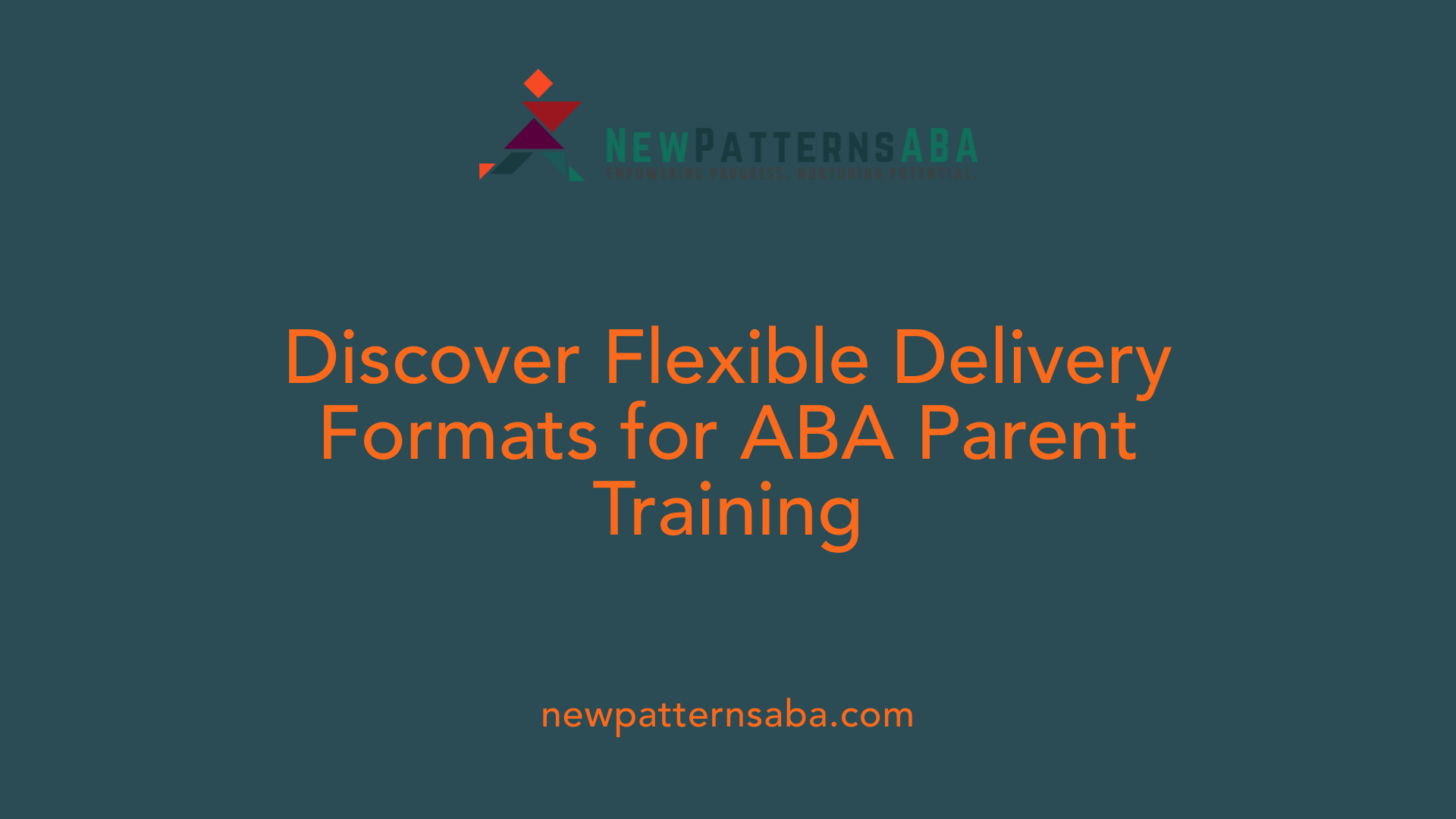Understanding the Critical Role of Parent Training in ABA Therapy
ABA therapy training for parents is a vital component of effective intervention for children with autism spectrum disorder (ASD). It equips caregivers with the necessary skills, strategies, and knowledge to support their child's development at home and in everyday environments. This article explores the essence of ABA parent training, its methods, benefits, available resources, and how parents can access comprehensive programs to maximize their child's progress.
What Is ABA Parent Training and Its Significance?
What is ABA parent training and why is it important?
ABA parent training involves teaching parents effective applied behavior analysis (ABA) techniques, strategies, and principles to support their child's development both at home and in daily life. This training is essential because it equips parents with the tools needed to manage behaviors, foster communication, and encourage the child’s skill generalization across different settings.
By actively participating in training, parents become capable of implementing evidence-based strategies, such as reinforcement, functional communication, and naturalistic teaching methods. This not only improves treatment outcomes but also enhances the child's progress by providing consistent support outside of therapy sessions.
The training also plays a significant role in reducing parental stress and increasing confidence. When parents understand how to handle challenging behaviors and promote positive ones, they feel more empowered and less overwhelmed.
Furthermore, parent involvement ensures that learned skills are maintained and reinforced, preventing regression and supporting long-term development. It strengthens the parent-child bond and creates a more nurturing environment.
Overall, ABA parent training is a vital aspect of effective autism intervention, fostering better behavior, communication, and quality of life for children while supporting families in their caregiving journey.
How does training enhance treatment outcomes?
Training parents in ABA techniques leads to consistent implementation of strategies, which is crucial for generalizing skills across settings and maintaining progress. When parents are equipped with knowledge and skills, children tend to benefit more from therapy, with improvements seen in behavior, communication, and independence.
How does it help reduce parental stress and increase confidence?
Parents often face challenges in managing behaviors without proper guidance. Training provides them with practical skills and understanding, reducing frustration. It also builds confidence as parents see positive changes in their children and learn effective ways to support ongoing development.
Core Topics Covered in ABA Parent Training Programs

What topics are typically covered in ABA parent training programs?
ABA parent training programs are designed to equip parents with the skills they need to support their child's development effectively. These programs often include a comprehensive set of topics that serve as the foundation for successful behavioral interventions.
A primary focus is understanding the ABCs of behavior—Antecedents (what happens prior to a behavior), Behaviors (the actions of the child), and Consequences (what follows the behavior). Learning how to interpret these elements helps parents understand why behaviors occur and how to respond appropriately.
Functional behavior assessment (FBA) is another crucial topic. Parents learn to identify the purposes behind challenging behaviors, such as attention seeking or escape from tasks. This understanding allows caregivers to develop targeted intervention strategies that address the root causes.
Positive reinforcement techniques are central to ABA. Training covers how to schedule and deliver reinforcers effectively to encourage desirable behaviors. Parents also explore various reinforcement strategies, such as immediate praise or tangible rewards, tailored to motivate their child.
Teaching communication skills, including naturalistic methods, is a core component. The programs teach how to foster both expressive and receptive communication through play, everyday routines, and use of visual aids or alternative communication devices.
Developing daily routines and teaching life skills forms an integral part of training. This includes structured activities for toileting, dressing, feeding, and hygiene to promote independence.
Ensuring that learned skills generalize across different settings and are maintained over time is also emphasized. Strategies to support generalization include practicing skills in various environments and involving multiple people.
Finally, building rapport and a collaborative relationship between parents and children is encouraged. This fosters a positive environment conducive to learning and behavioral success.
Through these varied topics, parents gain a deep understanding of ABA principles, learn practical strategies, and become active partners in their child's developmental journey.
Delivery Methods of ABA Parent Training
 How is ABA training delivered to parents?
How is ABA training delivered to parents?
ABA parent training is mainly provided via behavioral skills training (BST), a structured approach that combines instruction, modeling, rehearsal, and feedback. This method ensures that parents actively learn and practice ABA strategies such as reinforcement, prompting, and behavior management in a way that’s easy to understand and apply.
Different formats suit diverse family needs. The training can be delivered in person, through group workshops, or online modules. Each setting offers flexibility and convenience, making it easier for parents to participate. For example, online courses often include interactive videos, cheat sheets, and digital assessments that enhance engagement and understanding.
Qualified professionals, particularly Board-Certified Behavior Analysts (BCBAs®), usually lead these training sessions. They tailor the content to the individual family’s goals and circumstances, ensuring that the strategies are relevant and practical. During sessions, they actively involve parents using techniques like active listening and motivational interviewing to build confidence and skills.
The materials used in training include videos demonstrating proper techniques, step-by-step guides, and assessment tools to monitor progress. This variety helps parents grasp concepts more effectively and refer back to resources as needed.
Customization is crucial in ABA parent training. Trainers assess each family’s unique situation, learning style, and cultural background to create a personalized plan. This individualized approach fosters better engagement and more effective learning.
Ongoing support doesn’t stop at initial training. Parents receive regular supervision, feedback, and progress reviews. Digital data collection tools help track improvements and identify areas needing reinforcement. Continuous follow-up encourages consistency and skill generalization across different environments like home, school, and community.
Overall, ABA parent training’s versatility in delivery methods ensures that parents are empowered to support their child's development actively, leading to better outcomes and stronger family dynamics.
Learning ABA Therapy: Accessing Resources for Parents
What types of educational resources are available for parents interested in ABA therapy?
Parents seeking to learn ABA therapy can access a variety of resources, including online courses, workshops, and personalized coaching services. Many platforms offer interactive modules, video lessons, and practical activities designed specifically for caregivers. For example, Forta provides comprehensive online training that includes a 10-hour course covering ABA fundamentals, behavior techniques, observation skills, and assessment methods.
Structured curricula such as the One-Year ABA Parent Training Curriculum further organize learning into manageable volumes focusing on meaningful behavior change, daily living skills, and social-emotional development. These curricula often include manuals, lessons, videos, and forms, with some offering Continuing Education Units (CEUs) to professionals and parents alike.
Which reputable providers and platforms offer ABA parent training?
Renowned organizations such as Autism Speaks, the Autism Partnership Foundation, and universities like the University of Washington and Georgia State University provide trusted ABA training programs. Many of these offer free modules and even certificates upon completion. Platforms like Rori Care and Master ABA deliver accessible, research-based online courses that cover key ABA principles and strategies.
These providers emphasize collaboration between parents and professionals, allowing for ongoing support and skill-building tailored to individual needs.
What are some structured curricula and what topics do they cover?
The One-Year ABA Parent Training Curriculum is designed to guide parents through a comprehensive learning process across three volumes. It includes research-based manuals, lessons, forms, and videos to improve skills like behavior reduction, communication, and daily routines.
Modules often cover topics such as:
- Introduction to ABA
- Naturalistic teaching strategies
- Reinforcement and punishment
- Functional communication
- Life skills including toileting, dressing, and feeding
- Managing behavior at home, school, and in the community
Are there certification options and CEUs available?
Yes, many programs offer certification courses with CEUs recognized in the ABA field. For example, a 30-hour course available through some providers grants BACB (Behavior Analyst Certification Board) Learning CEUs, enabling parents and professionals to formalize their training.
Gaining certification helps parents support their child's learning effectively outside clinical settings and may count toward professional development.
How can parents access free resources and maximize their benefits?
Numerous reputable organizations provide free ABA training modules for parents. These often include videos, worksheets, and quizzes to reinforce understanding. For instance, the Autism Partnership Foundation offers a free 6-part parent training series covering ABA basics, skill building, and behavior management.
Using free resources, parents can start learning about reinforcement, social skills, and routines, which can be practically implemented to support their children.
What are the benefits of professional guidance and ongoing support?
Having a trained BCBA or BCaBA supervise parent efforts ensures strategies are effectively applied, tailored to the child's needs, and consistent. Ongoing support through coaching, feedback, and supervision encourages skill mastery and helps troubleshoot challenges.
This collaborative approach empowers parents, reduces stress, and results in better generalization of skills across settings, ultimately supporting the child's development and family harmony.
What Parent Training Entails and How to Access It

What does ABA parent training involve, and how can parents access it?
ABA parent training provides families with the knowledge and skills needed to support their child's development using Applied Behavior Analysis principles. It goes beyond mere education, offering structured modules that cover fundamental concepts such as behavior management, goal setting, communication techniques, and adaptive skills. Parents learn to implement reinforcement strategies, naturalistic teaching, and assessment methods, all tailored to their child's unique needs.
Typically, this training includes practical elements like observing behavior, recording data, and adjusting interventions based on ongoing assessments. Parents can access training in multiple formats, including online courses, live workshops, group training sessions, and one-on-one coaching with certified professionals such as Board Certified Behavior Analysts (BCBAs). These formats allow flexibility and cater to different learning preferences.
Digital tools like videos, manuals, and interactive modules are often used to enhance learning. These resources help parents practice skills in real life, receive feedback, and track progress effectively. Many programs also emphasize collaboration with professionals for ongoing support, ensuring that parents feel confident and capable of applying ABA techniques consistently.
The ultimate goal of ABA parent training is to empower families, improve treatment generalization across settings, and support children’s developmental growth more effectively. Accessing these services is straightforward through clinic referrals, online educational platforms, and community workshops dedicated to ABA principles, making active parental involvement more accessible than ever.
Benefits of Parental Involvement in ABA Therapy
What are the benefits of parent involvement and training in ABA therapy outcomes?
Parent participation in ABA therapy has a profound impact on the progress and success of treatment for children with autism spectrum disorder (ASD). When parents are trained and actively involved, they can provide consistent, evidence-based interventions outside the clinical setting, fostering a more comprehensive approach to their child's development.
Research shows that trained parents are more effective in promoting skill acquisition, including communication, social interactions, and emotional regulation. Their involvement often leads to measurable improvements such as reduced challenging behaviors and increased positive actions.
Several studies, including meta-analyses and randomized controlled trials, confirm that parent-implemented strategies have moderate to strong effects on treatment goals. These include boosting language skills, encouraging social engagement, and decreasing maladaptive behaviors.
Beyond observable child benefits, parent training can also improve parental mental health by reducing stress, anxiety, and depression linked with caregiving. It helps parents feel more confident and capable, which can overcome barriers like workforce shortages or logistical issues that prevent regular access to therapy.
In summary, involving parents in ABA therapy not only enhances the child's progress but also ensures continuity of care, making the intervention more effective and sustainable over the long term. Their active role amplifies the impacts of professional strategies, leading to better outcomes and a more empowered family unit.
The Seven Dimensions of ABA and Quality Assurance

What are the seven dimensions of ABA?
Applied Behavior Analysis (ABA) is guided by seven important aspects that ensure its practices are effective, reliable, and scientifically sound. These dimensions serve as standards to evaluate the quality of ABA interventions and research.
The seven dimensions are:
- Generality: Behavior changes should last over time, occur across varied settings, and be demonstrated by different individuals.
- Effectiveness: Interventions should produce meaningful improvements that are relevant to everyday life.
- Technological: Procedures must be described in enough detail so that others can replicate them accurately.
- Applied: The focus is on socially significant behaviors that improve client functioning.
- Conceptually Systematic: Treatments are grounded in well-established ABA principles and research.
- Analytic: Changes in behavior are a result of the intervention, shown through careful analysis.
- Behavioral: Focuses on observable and measurable behaviors.
These principles ensure that ABA remains a rigorous and trustworthy discipline. They help professionals and families evaluate the quality of treatment, both in research settings and real-world applications. By adhering to these dimensions, practitioners can deliver interventions that are scientifically sound and truly beneficial.
The importance of these dimensions in evaluating ABA practice
Using these seven dimensions as a guiding framework promotes high standards and accountability. It ensures that ABA programs are not only based on empirical evidence but also are tailored to produce durable, meaningful change for individuals.
Moreover, emphasizing technological and conceptual systematicity fosters consistency and transparency in treatment implementation. The analytic dimension underscores the importance of data collection and analysis to confirm that behavior change is genuinely due to the intervention.
Maintaining quality and scientific rigor
Incorporating these dimensions into practice encourages continuous quality improvement. It helps identify areas needing enhancement, ensures treatments are grounded in science, and maintains public trust in ABA therapies.
In summary, the seven dimensions of ABA serve as a foundation for evaluating and ensuring the delivery of high-quality, effective, and ethical behavior analysis services.
Empowering Families Through Knowledge and Support
Effective ABA parent training is essential for maximizing treatment success for children with autism spectrum disorder. By understanding the core principles, actively participating, and utilizing available resources, parents can become confident advocates and implementers of ABA strategies. Collaborating with professional providers, leveraging online platforms, and gaining practical skills help ensure sustained progress, improved communication, and a higher quality of life for their children. Ultimately, informed and supported families are better equipped to foster meaningful, lasting change, making ABA parent training a foundational element in holistic autism care.
References
- Parent Training For Online ABA - Forta Health
- ABA Training for Parents Online Course - Relias Academy
- Association for ABA Parent Training
- ABA Training for Parents: All You Need to Know
- ABA Parent Training Academy
- Parent Training as a Medical Necessity in ABA Therapy
- Parent Training in Applied Behavior Analysis Treatment
- ABA Parent Training - Mindful Sprouts
- Applied Behavior Analysis (ABA) | Boston Medical Center





